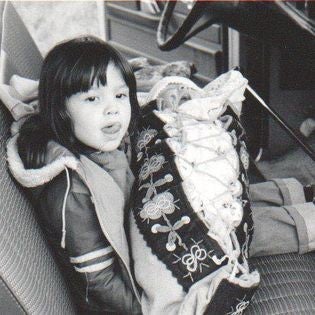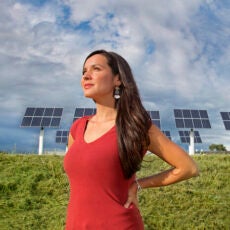
Indigenous Communities are Leading the Way to a Just Transition
Indigenous peoples have understood how to live in sustainable relationship with the Earth for thousands of years. Indigenous ecological knowledge brings with it solutions to the climate crisis.
Tansi kwakiya, my name is Melina Laboucan-Massimo. I am Lubicon Cree and was born in my home community of Little Buffalo, in Northern Alberta. Little Buffalo is in the heart of the tar sands – a massive site of oil extraction, devastating an area of land larger than the state of Florida. I grew up drinking water straight from the streams. I can remember the beauty of our territory.

The community that I come from is a sacrifice community. We have felt the brunt of environmental contamination since I was born. The prevailing “not in my backyard” attitude means that these sacrifice zones are often placed in or surrounding BIPOC communities. The toxic burden that we bear is a lived reality in my community. The compromised quality of the water we drink and the air we breathe reminds me everyday that our current system is inequitable and unsustainable.
Before colonization occurred on this continent, Indigenous peoples were thriving in a healthy and balanced ecosystem. It is no coincidence that the land was in pristine condition teeming with abundance, because Indigenous peoples knew how to live in a reciprocal relationship with the land. Despite the Canadian government forcing us to relocate to reserves, outlawing our governance structures, kidnapping children to residential schools, and enacting environmental racism, we still retain our ecological knowledge of stewardship to the Earth. Indigenous peoples across Turtle Island (North America) are working hard to restore our ways of knowing and being.
In 2011, when a pipeline rupture spilled more than 1,000,000 gallons of oil in my home territory and I witnessed my family and community being poisoned, I knew I needed to think of climate solutions to replace our forced dependence on fossil fuels. I decided to pursue my Master’s degree in Indigenous Governance with a focus on renewable energy at the University of Victoria, BC. I believe it is critical to do more than simply talk about climate solutions: we must also implement them to adequately abate the climate crisis. As a part of my master’s thesis, I built a 20.8-kilowatt solar system that powers the health center in my home community.
After many years of working in the environmental movement, I founded Sacred Earth Solar and co-founded Indigenous Climate Action because I wanted to share what I had learned with other Indigenous communities to assist them in implementing their own solutions in order to address the environmental and climate impacts they are facing.
Indigenous knowledge and scientific inquiry are often spoken about as separate, but Indigenous knowledge stems from thousands of years of active inquiry, observation and relationship. There will be no ‘silver bullet’ new technology that will undo all of the devastation we are causing to Earth. What Indigenous knowledge allows for is a rebalancing, a remembering and a reimagining of what our relationships look like.
A Just Transition involves thinking not only through what a clean energy future will look like, but how we will get there in an equitable way. A Just Transition places Indigenous communities at the forefront of the energy transition to ensure that our future energy system does not reproduce the imbalances and inequities of the current one. Indigenous communities are already leading the way towards this transition with hundreds of energy conservation, food security and renewable energy projects, as highlighted in the TV series I host, Power to the People.
To address the climate crisis, a global paradigm shift back to living within the natural laws of our Earth is essential. If we are to truly implement a Just Transition, Indigenous communities can no longer be sacrificed by extractivism that created the climate crisis in the first place.
Melina Miyowapan Laboucan-Massimo
Founder, Sacred Earth SolarMelina Laboucan-Massimo is an internationally renowned advocate for climate justice, Indigenous sovereignty, and women’s rights. She is the Founder of Sacred Earth Solar and a 2021-2022 Kleinman Center Visiting Scholar.

